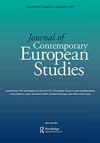Spain as the EU’s ‘champion’ in Latin America: elites, government trustworthiness, and free trade
IF 1.8
3区 社会学
Q1 AREA STUDIES
引用次数: 0
Abstract
ABSTRACTThis paper addresses attitudes around the projection of the EU among Latin American elites, namely the determinants of support for a Free Trade Agreement between the two regions and the trustworthiness of the EU government. We take as data elite surveys conducted in 15 Latin American countries (2014–2019) and consider sociodemographics, ideology, support for democracy, views of foreign powers, exports to the EU, and electoral democracy. Results show that ideology and support for democracy are key determinants of support for an interregional FTA, and that the trustworthiness of governments in the US, China, and Spain covary with attitudes toward the EU. The latter (trust in the government in Spain) proves to be the main driver and, furthermore, its impact is conditional on the economic strength (observed as exports) of the EU: wherever the EU is not a strong economic actor in Latin America, trust in the Spanish government does nothing but improve the image of the EU.KEYWORDS: Elitesgovernment trustworthinessFTAEULatin America Disclosure statementNo potential conflict of interest was reported by the author(s).Supplemental dataSupplemental data for this article can be accessed online at https://doi.org/10.1080/14782804.2023.2271846.Notes1. Lower Chambers in the case of bicameralism. For more information on the dataset see: https://oir.org.es/pela/en/2. Not national governments, but the European guiding authorities (that is, the Executive), regardless of the name appearing in the questionnaire. This question is one of a battery where legislators are also asked about the trustworthiness of the governments of the US, Russia, China, and Spain.3. The levels of confidence that LAC legislators express in the Spanish government vary from 66.7% (Uruguay in 2015) to 91.4% (Dominican Republic in 2017). There seems to be no impact on these percentages based on the government’s ideology. In 2017, for example, 86.2% of Nicaraguan legislators, mostly left-leaning, expressed confidence in the Spanish government, which was led at that time by conservative Mariano Rajoy. In comparison, during 2018, 84.9% of Colombian legislators, mostly right-leaning, voiced trust in the current Spanish government led by socialist Pedro Sánchez.4. The two questions on trustworthiness correlate positively (0.51), as expected. In the paper, we build the case that views on the EU in LAC are in part driven by attitudes toward specific EU members, especially Spain. A positive perception of the EU might have a feedback effect on the perception of EU members, but in the case of Spain we expect the causality to extend from that single EU member to the EU as a whole. Unlike other EU countries, Spain has maintained a long-term special relationship with LAC (Ayuso Pozo Citation2014).5. For more information on the descriptives of the variables and details of the analysis, see the supplementary file.6. Although the trade share of the EU might seem low when compared to countries like China or the US, commerce (and by extension FTAs) is the best indicator for operationalization of economic ties (hard power). Variations between countries are not small: shares of exports range from 3.5% in El Salvador to 22.6% in Costa Rica. Still, we ran alternative models with exports recorded by whether the EU was the first to seventh trading partner of each country. Results did not significantly differ from those displayed in Table 2.西班牙作为欧盟在拉丁美洲的“冠军”:精英、政府诚信和自由贸易
摘要本文探讨拉丁美洲精英对欧盟的态度,即支持两个地区之间的自由贸易协定和欧盟政府的可信度的决定因素。我们以在15个拉丁美洲国家(2014-2019年)进行的精英调查为数据,并考虑了社会人口统计学、意识形态、对民主的支持、对外国势力的看法、对欧盟的出口和选举民主。结果显示,意识形态和对民主的支持是支持区域间自由贸易协定的关键决定因素,美国、中国和西班牙政府的可信度与对欧盟的态度相关。后者(对西班牙政府的信任)被证明是主要驱动因素,此外,其影响取决于欧盟的经济实力(观察为出口):无论欧盟在拉丁美洲不是一个强大的经济参与者,对西班牙政府的信任除了改善欧盟的形象之外什么都没有。关键词:精英;政府信任度;亚太经合组织;拉丁美洲披露声明作者未报告潜在利益冲突。补充数据本文的补充数据可以在线访问https://doi.org/10.1080/14782804.2023.2271846.Notes1。两院制下的下议院。有关数据集的更多信息,请参见:https://oir.org.es/pela/en/2。不是国家政府,而是欧洲指导当局(即执行机构),不管问卷上出现的名字是什么。这个问题是立法者还被问及美国、俄罗斯、中国和西班牙政府的可信度的一系列问题之一。拉美和加勒比地区立法者对西班牙政府的信心水平从66.7%(乌拉圭2015年)到91.4%(多米尼加共和国2017年)不等。根据政府的意识形态,这些百分比似乎没有受到影响。例如,2017年,86.2%的尼加拉瓜议员(多数为左倾)对当时由保守派拉霍伊(Mariano Rajoy)领导的西班牙政府表示信心。相比之下,在2018年期间,84.9%的哥伦比亚立法者(主要是右倾)表示信任由社会主义者佩德罗Sánchez.4领导的现任西班牙政府。正如预期的那样,两个问题的可信度正相关(0.51)。在本文中,我们建立了一个案例,即LAC对欧盟的看法在一定程度上是由对特定欧盟成员国(尤其是西班牙)的态度驱动的。对欧盟的积极看法可能会对欧盟成员国的看法产生反馈效应,但在西班牙的情况下,我们预计因果关系将从单个欧盟成员国扩展到整个欧盟。与其他欧盟国家不同,西班牙与LAC保持着长期的特殊关系(Ayuso Pozo Citation2014)。有关变量描述和分析细节的更多信息,请参阅补充文件。尽管与中国或美国等国家相比,欧盟的贸易份额可能看起来很低,但商业(以及延伸的自由贸易协定)是经济关系(硬实力)运作的最佳指标。各国之间的差异也不小:出口份额从萨尔瓦多的3.5%到哥斯达黎加的22.6%不等。尽管如此,我们还是运行了另一种模型,根据欧盟是否是每个国家的第一到第七大贸易伙伴来记录出口。结果与表2显示的结果无显著差异。
本文章由计算机程序翻译,如有差异,请以英文原文为准。
求助全文
约1分钟内获得全文
求助全文
来源期刊

Journal of Contemporary European Studies
Multiple-
CiteScore
2.70
自引率
7.70%
发文量
84
期刊介绍:
The Journal of Contemporary European Studies (previously Journal of European Area Studies) seeks to provide a forum for interdisciplinary debate about the theory and practice of area studies as well as for empirical studies of European societies, politics and cultures. The central area focus of the journal is European in its broadest geographical definition. However, the examination of European "areas" and themes are enhanced as a matter of editorial policy by non-European perspectives. The Journal intends to attract the interest of both cross-national and single-country specialists in European studies and to counteract the worst features of Eurocentrism with coverage of non-European views on European themes.
 求助内容:
求助内容: 应助结果提醒方式:
应助结果提醒方式:


